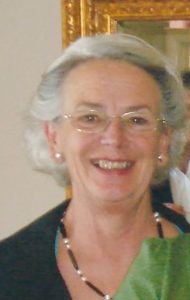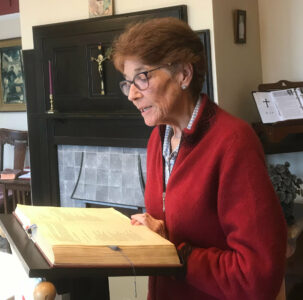The Word was Made Flesh and Dwelt Amongst Us

by Sue Jones
For a Catholic, the personal desire to know God and the love of Jesus Christ through the habit of Lectio Divina should be matched by a desire to know and receive Jesus Christ in the Eucharist. The Mass is a time when Word and Sacrament come together in prayer. For the person taking up the prayerful habit of Lectio Divina, hearing the Word proclaimed in community assumes a new connection to the Eucharist tasted and eaten. Previously this connection may have been a heady, liturgical connection but now becomes a heartfelt matter of love.
The desire to pray through, or perhaps contemplate, the life of Jesus Christ in the sacraments for some time during their celebration is one of those verdant, green shoots of love which is currently springing up amongst the laity. Those, who through the Gospels are discovering a fresh love of God and all that God has done for humankind, are discovering that they need a deeper more Catholic understanding and experience of the Eucharist to help them till that common or garden soil of life in order to ‘be’ sacrament to others.
Unsurprisingly then, the habit of going to Mass on Sunday is a both a good start for the practice of Lectio Divina and a source of spiritual sustenance for those who are persevering with it. A love of the Word has its roots, for most, in a sacramental Catholic childhood. We tend to think of Lectio Divina as a sophisticated adult prayer separated from other childish forms of prayer but it has rather humble, evangelical beginnings in the Word proclaimed in community over and over in every era.
When the Word comes amongst us at Mass on Sunday we are called to let it go down to the earthy depths of our hearts where it touches our conscience, hinting at changes we need to make to our love in order to share in God’s merciful and compassionate love of the world. We are then prompted by God’s Holy Spirit to take what we find in our hearts, all our failings and joys, into the heart of the Eucharist so that the Word may be sacramentalised in us.
Letting the Word touch our deepest being thus, we go into the Eucharist with the express, prayerful, needy desire to get up close and personal with this Person who is God’s Son, to know, receive and contemplate the food that is the Word made flesh amongst us for the life of the world.
 A person whose soul is disturbed by the Word proclaimed in community immediately has a sense of being an individual before God. Moses had it. Jesus Christ had it. Some may think that there is no room for this personal feeling at Mass. But the one who, spiritually speaking, dares to go out of the comfort of community warmth and fellowship into the sacred, more impersonal yet lively life of the Eucharist unfolding on the altar, makes a little journey in which he or she gets to know the unknowable love of God a little better.
A person whose soul is disturbed by the Word proclaimed in community immediately has a sense of being an individual before God. Moses had it. Jesus Christ had it. Some may think that there is no room for this personal feeling at Mass. But the one who, spiritually speaking, dares to go out of the comfort of community warmth and fellowship into the sacred, more impersonal yet lively life of the Eucharist unfolding on the altar, makes a little journey in which he or she gets to know the unknowable love of God a little better.
As we go up, spiritually speaking, to the altar we join Jesus Christ at Calvary. To be there is to have a sense that I am a Catholic person who, for a sacred and most necessary moment in time, is transfixed between a world which is perfectly ordered in sacredness, and a world order which is distorted by Original Sin. It is in this place that God likes to “say the word,” to touch each person’s soul according to their particular needs of which the community may be quite unaware.
If I am not a person whose soul is disturbed by the Word proclaimed at Mass I can miss out on my body being broken open with Jesus Christ’s body on the Cross. I do not begin to understand, let alone suffer the great mystery of God’s love which kept him hanging there in that distorted world. If I do not allow my body to be broken with Jesus Christ, how on earth can I know and share in God’s even greater love and hope which raises me up in the Resurrection, giving me the great joy of being raised up above my sinfulness to love and laugh another day?
The person whose love is always dying to itself goes out from Mass on Sunday “to love and serve the world” with a heightened, living sense of being sacrament in a world distorted by Original Sin. Being sacrament in the world is not a new idea. It is an ancient, sensible idea which Vatican II thought needed revitalising with the power of the Word.
 Entries(RSS)
Entries(RSS)